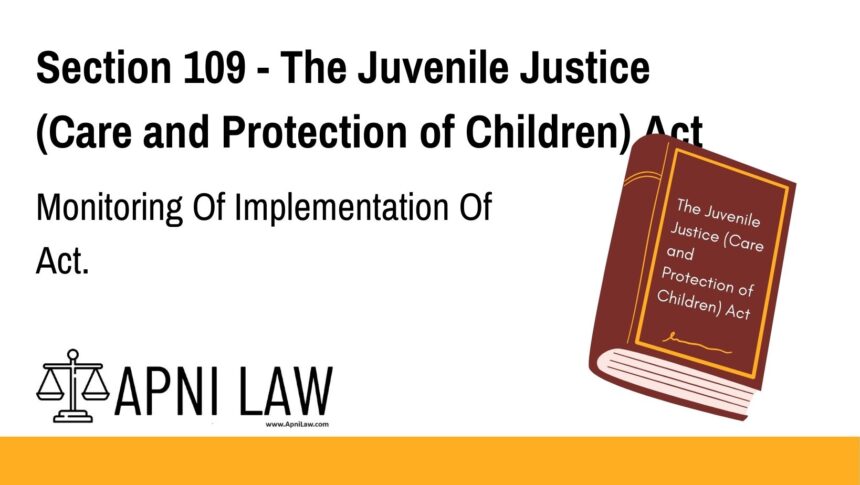Code: Section 109 JJ Act
(1) The National Commission for Protection of Child Rights constituted under section 3, or as the case may be, the State Commission for Protection of Child Rights constituted under section 17 (herein referred to as the National Commission or the State Commission, as the case may be), of the Commissions for Protection of Child Rights Act, 2005 (4 of 2006), shall, in addition to the functions assigned to them under the said Act, also monitor the implementation of the provisions of this Act, in such manner, as may be prescribed.
(2) The National Commission or, as the case may be, the State Commission, shall, while inquiring into any matter relating to any offence under this Act, have the same powers as are vested in the National Commission or the State Commission under the Commissions for Protection of Child Rights Act, 2005 (4 of 2006).
(3) The National Commission or, as the case may be, the State Commission, shall also include its activities under this section, in the annual report referred to in section 16 of the Commissions for Protection of Child Rights Act, 2005 (4 of 2006).
Explanation of Section 109 JJ Act
Section 109 ensures that the Juvenile Justice Act is properly enforced. It assigns the responsibility of monitoring to two key institutions:
- The National Commission for Protection of Child Rights (NCPCR)
- The State Commission for Protection of Child Rights (SCPCR)
These bodies already work to protect children’s rights under the Commissions for Protection of Child Rights Act, 2005. Section 109 gives them additional power to oversee how well the Juvenile Justice Act is being followed.
They are also expected to report their findings each year. This report should include all their activities related to monitoring the Act.
Illustration
Example 1: Monitoring a Child Care Institution
The State Commission conducts a surprise inspection at a registered child care institution. They find that some children are not receiving proper food or education. The Commission records these violations and sends a report to the authorities for immediate action.
Example 2: Including Findings in the Annual Report
The National Commission compiles complaints, investigations, and corrective actions taken throughout the year. These details are added to its annual report, which is submitted to the central government and made public.
Common Questions and Answers on Section 109 JJ Act
1. Who ensures that the Juvenile Justice Act is followed?
Both the National and State Commissions for Protection of Child Rights monitor the implementation of this Act.
2. What powers do these commissions have?
They have the same powers as provided under the Commissions for Protection of Child Rights Act, 2005. This includes conducting inquiries, summoning witnesses, and inspecting institutions.
3. Do they submit reports?
Yes. Each year, they must include their activities related to the Juvenile Justice Act in their official annual reports.
4. Can the commissions investigate crimes under the JJ Act?
Yes. While investigating any matter related to offences under the Act, they can exercise full legal authority just like under their parent Act.
5. Are their reports made public?
Typically, annual reports are tabled before the government and may be made available to the public. This promotes transparency and accountability.
Conclusion
Section 109 of the Juvenile Justice Act empowers two key child rights bodies to keep a close watch on how the Act is applied. By granting them legal authority and requiring annual reporting, the law ensures that children’s rights are protected in practice, not just in theory.
For more legal guides and child protection laws, visit 👉 ApniLaw.








